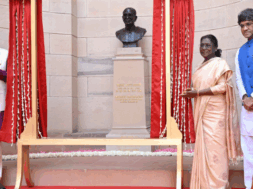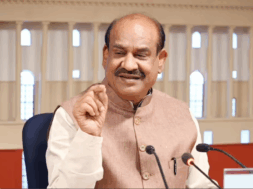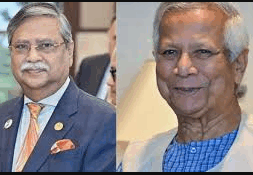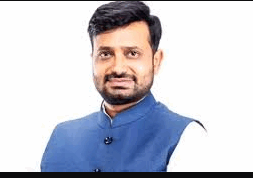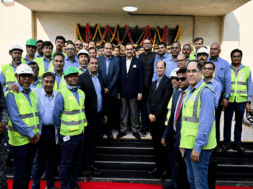
Manas Dasgupta
NEW DELHI, June 27: The centre has decided to extend the benefits of the Modi government’s flagship “Ayushman Bharat” scheme to provide health cover to every senior citizen above the age of 70, President Droupadi Murmu announced on Thursday.
Inaugurating the first session of the new Lok Sabha, Ms Murmu said every Indian citizens aged above 70 years would be provided free treatment under the Ayushman Bharat health insurance scheme. The opening of 25,000 Jan Aushadhi Kendras in the country was also progressing at a fast pace, she said.
Under the Ayushman Bharat-Pradhan Mantri Jan Arogya Yojana (AB-PMJAY), free health services are being provided to 55 crore beneficiaries belonging to the poor families. It would now be extended to all above the age of 70 without any economic criteria. “Further, the Government is going to take yet another decision in this area. Now every elderly person above 70 years of age will also be covered and get the benefit of free treatment under Ayushman Bharat Yojana,” the President said.
The AB-PMJAY, the largest publicly funded health insurance scheme in the world, aims to provide health cover of ₹ 5 lakh per family per year for secondary and tertiary care hospitalisation to 12 crore families. Hospital Empanelment and Management (HEM) guidelines for empanelment of hospitals under AB-PMJAY mandates the State Health Agencies (SHAs) with the responsibility of empanelling hospitals under the scheme.
Ms Murmu also said the government had decided to conduct feasibility studies for bullet train corridors in the country’s north, south and east. Highlighting infrastructure development in the country, which according to her, has emerged as the new face of a changing India, President Murmu said, “My Government has decided to conduct feasibility studies for bullet train corridors in the North, South and East of the country.”
In her speech, she also mentioned the ongoing high-speed rail project between Ahmedabad and Mumbai in the western part of the country. “Work on the High-Speed Rail Ecosystem between Ahmedabad and Mumbai is also progressing at a rapid pace,” President Murmu said.
The 508-km Ahmedabad-Mumbai high-speed corridor is the first in the country on which a bullet train will run at 320 kmph speed covering the whole distance in just 2 hours and 7 minutes with limited stops at Surat, Vadodara and
The National High-Speed Rail Corporation Limited, which is constructing the project, has announced the projected completion of its first phase between Surat and Bilimora by August 2026.
Speaking on the government’s efforts to make India’s public transport system one of the best in the world, she said, “In 10 years, Metro has reached 21 cities. Work is going on in many schemes such as Vande Metro.”
Opposition parties raised slogans against the Centre during her address over issues such as Manipur violence, NEET paper leak, and the new criminal laws, set to come into force in July. “The world is witness to the fact that the people of India have elected a stable government with a clear majority for the third consecutive term. This has happened after six decades,” the President said.
The opposition objected to it and continued their sloganeering when the President raised the matter of Emergency. “Emergency was the biggest and darkest chapter of direct attack on Constitution. Entire country plunged into chaos during Emergency, but our nation was victorious against such unconstitutional powers,” President Murmu said.
On the government’s foreign policy, she said India has strengthened its relations with neighbouring countries and the government was giving emphasis to connectivity initiatives in East Asia, Middle East and Europe. India was also increasing cooperation with countries in the Indo-Pacific region. India is the “first responder in any crisis” and has become a strong voice of the Global South because of its human-centric approach, she said.
“Following the ‘Neighbourhood First’ policy, India has strengthened its relations with neighbouring countries. Participation of the leaders of seven neighbouring countries in the swearing-in ceremony of the Union Council of Ministers on June 9 reflects this priority of my government,” Murmu said, referring to leaders of Bangladesh, Bhutan, Nepal, Maldives, Mauritius, Seychelles and Sri Lanka attending the government’s inauguration.
“Be it East Asia or Middle East and Europe, my government is giving great emphasis on connectivity. It is India’s vision that has given shape to the India Middle East Europe Economic Corridor (IMEC),” she said. “This corridor will prove to be one of the biggest game-changers of 21st century.” The IMEC was launched on the margins of last year’s G20 Summit. Work on the initiative, however, has been impacted by the Israel-Hamas conflict.
Murmu said as the global order takes on a new shape in the third decade of 21st century, India was giving new confidence to the world as a “Vishwa Bandhu” (friend of the world). “India has been at the forefront in safeguarding humanity, be it the Corona crisis or an earthquake or a war…India also brought the world together on various issues during her G20 presidency,” she said.
The African Union was made a permanent member of the G20 during India’s presidency and this “strengthened the confidence of Africa and the entire Global South”, she added.
India is known not for adding to the challenges the world is facing, but for providing solutions, she said. “As a Vishwa Bandhu, India has taken initiatives in providing solutions to many global problems,” she added, referring to the country’s work in areas such as climate change, food security and sustainable agriculture.
The government has increased renewable energy capacities manifold and the country was achieving climate-related targets ahead of schedule. “Our initiatives towards net zero are an inspiration for many countries. A record number of countries have associated with us on our initiatives such as the International Solar Alliance,” she said.
In a riposte to critics of the decision to abrogate article 370 in Jammu and Kashmir, she said a “very heartening aspect” of the recent election emerged from region, especially the Kashmir Valley, which broke all records of voter turnout of many decades.
“Enemies of India continued to spread false propaganda at global forums, projecting it as an opinion of Jammu and Kashmir. But this time the Kashmir Valley has given a befitting reply to every such element within the country and outside,” Murmu said.






